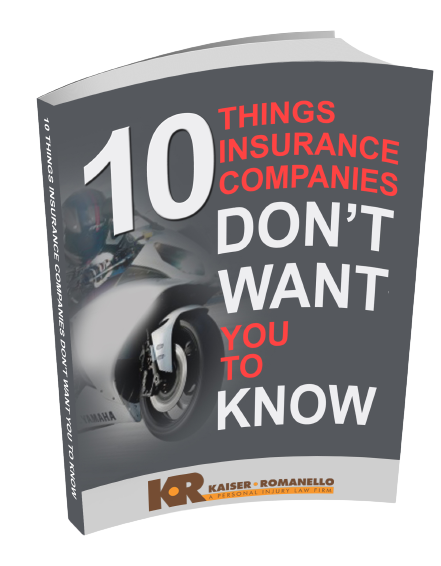News| Tragic Gainesville Crash Highlights Dangers on Florida Roads
Tragic Gainesville Crash Highlights Dangers on Florida Roads We Don’t…
A motorcycle crash in Coral Springs can leave you broken—physically, emotionally, and financially. You’re grappling with injuries, medical bills, and the uncertainty of what’s next, all while the insurance company fights to pay you as little as possible. At Kaiser Romanello Accident & Injury Attorneys, we understand your pain. With nearly 25 years of experience as personal injury lawyers, we’ve helped Coral Springs motorcyclists secure the fair compensation they need to rebuild their lives.
Coral Springs’ busy streets—like Sample Road, University Drive, or Coral Ridge Drive—are a rider’s paradise until they’re not. Florida tallied 581 motorcycle fatalities in 2024, per the Florida Highway Safety and Motor Vehicles Crash Dashboard, and Broward County feels that weight. Potholes, distracted motorists, and crowded intersections turn a joyride into a nightmare.
Our Coral Springs motorcycle accident lawyers fight for your medical expenses, lost wages, and peace of mind. We’re committed to every motorcycle accident claim, delivering verdicts and settlements that reflect your real losses.
After your motorcycle accident in Coral Springs, the insurance company might point fingers at you or minimize your suffering. Florida’s laws skip no-fault protection for motorcyclists, leaving you to face the at-fault party’s insurer alone. Common crash triggers—like a motorist ignoring your right of way—get spun to dodge responsibility.
The NHTSA reports motorcyclists are 28 times more likely to die in a crash than car drivers per mile traveled. Whether it’s a minor scrape or a wrongful death, we treat every case with the urgency it deserves. Our personal injury lawyers know the legal process inside out, ensuring your injury claim stands strong.
Kaiser Romanello takes the burden off your shoulders. Our Coral Springs motorcycle accident attorneys dive deep—investigating crash scenes, negotiating with insurers, and preparing for trial if needed. With nearly 25 years of experience handling personal injury cases, we’ve secured fair compensation for motorcycle riders across Florida.
Our verdicts speak to our track record—decades of wins for clients just like you.
Motorcycle crashes dish out brutal types of injuries. Serious injuries like spinal damage or head trauma can rob you of your independence. Even road rash, fractures, or internal bleeding pile up costly medical expenses and recovery time.
Our motorcycle accident injury attorneys in Coral Springs target every loss: medical care, physical therapy, lost income. We’re not just here for motorcycle accidents—our expertise spans medical malpractice and other personal injury cases, giving us a broad edge.
Coral Springs’ streets carry hidden dangers. Busy intersections and distracted drivers make every ride a gamble. Potholes or uneven pavement can wrench control from even seasoned riders.
Our Coral Springs motorcycle accident lawyers know these hazards intimately, using that insight to strengthen your personal injury claim.
The legal process after a Coral Springs motorcycle crash can feel overwhelming. What are your legal options? How do you start? We simplify it.
Need to discuss your motorcycle accident claim? Call us at 844-877-8679 for a free consultation.
Waiting isn’t an option. The longer you delay, the tougher it gets to secure fair compensation. Insurers might offer a quick settlement, but it rarely covers long-term needs—think ongoing medical bills or lost income.
A motorcycle crash doesn’t have to define your life in Coral Springs. You deserve a voice, and Kaiser Romanello Accident & Injury Attorneys is here to amplify it. With nearly 25 years of experience, we’ve helped motorcycle riders across Broward County and beyond recover what’s rightfully theirs.
Let’s secure your fair compensation and get you back on track.
Negligent Security
Ride Share
Car Accident
“Kaiser Romanello changed my life. They are The Dream Team! Could not recommend them anymore! If you want to get the most money for your personal injury claim call Kaiser Romanello today!”

Former client

“l just got off the phone with Mr. Loren Kaiser for a free consultation and he was absolutely amazing. He was extremely helpful, detail oriented and did not add any “rushed” feeling to the phone call. If I have anything substantial to move forward with, I will proudly utilize this law office. Thank you, Mr. Kaiser, for your help, input and advice! It is greatly appreciated.”

Former client

“Steve and his partner are just very knowledgeable, amazing client service, Steve it is the kind of persons who loves what he is doing, he went about and beyond his lawyer responsibilities in my case, they care about you, If you are looking for professionals at the highest levels, use their services. Not only you will be represented by top lawyers, but you feel like part of the family. Thanks for everything, God bless you.”

Former client


Tragic Gainesville Crash Highlights Dangers on Florida Roads We Don’t…
When an Ambulance Crash Leaves You Injured: Get the Legal…
Tragic Gainesville Crash Highlights Dangers on Florida Roads We Don’t…
When an Ambulance Crash Leaves You Injured: Get the Legal…